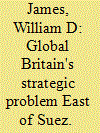| Srl | Item |
| 1 |
ID:
178501


|
|
|
|
|
| Summary/Abstract |
Why did Britain withdraw from its military bases in the Arabian Peninsula and Southeast Asia midway through the Cold War? Existing accounts tend to focus on Britain's weak economic position, as well as the domestic political incentives of retrenchment for the ruling Labour Party. This article offers an alternative explanation: the strategic rationale for retaining a permanent presence East of Suez dissolved during the 1960s, as policymakers realised that these military bases were consuming more security than they could generate. These findings have resonance for British officials charting a return East of Suez today under the banner of ‘Global Britain’.
|
|
|
|
|
|
|
|
|
|
|
|
|
|
|
|
| 2 |
ID:
178637


|
|
|
|
|
| Summary/Abstract |
“Global Britain” has become the framing concept for post-Brexit foreign policy pursued by successive Conservative prime ministers. Despite exaggerated rhetoric to the contrary, this has not led to a significant shift in Britain’s Gulf strategy, but rather intensified the pursuit of the existing network of bilateral relationships underpinned by security cooperation, defence exports and inward investment. A modest uplift of UK military presence in the Gulf has not demonstrably increased UK influence in the region or over the regional decisions of the Trump administration. This leaves the UK more exposed to risk from deteriorating relations between the US and Iran. It also highlights the delicate balance between Britain’s increasing focus on pursuing domestic economic objectives and its modest defence, diplomatic and security contribution to stability in the Gulf. As Saudi Arabia and the UAE pursue increasingly active and independent regional policies, the UK must reappraise commitments implicit in its interdependent trade- and security-focused strategy to prepare for the possibility of difficult choices, both between allies and about the nature of UK involvement in future regional conflicts.
|
|
|
|
|
|
|
|
|
|
|
|
|
|
|
|
| 3 |
ID:
158438


|
|
|
|
|
| Summary/Abstract |
As Britain prepares to leave the European Union after the popular vote of June 2016, the government is embarking on the revision of foreign policy. Boris Johnson, or ‘just Boris’, has been entrusted with forging the new ‘Global Britain’ for the post-Brexit era and reinventing British economy around new relationships. Boris has a track record of misrepresenting and offending foreign peoples, leaders and countries. This article assesses the prospects for Africa in Johnson’s vision for ‘Global Britain’ as presented in his foreign policy speeches. The paper unpacks Johnson’s discursive construction of ‘Africa’ and inserts it into a broader historical and political context of British relations with Africa. It argues that, by constructing Africa as a ‘problem’ and offering liberal values as a condition for development, Johnson is continuing British imperial and post-colonial discourses of ‘developing’ or ‘civilizing’ Africa. In the post-Brexit world of a changing global balance of power, democratic conditionality serves to sustain and reproduce British forms of power and policies.
|
|
|
|
|
|
|
|
|
|
|
|
|
|
|
|